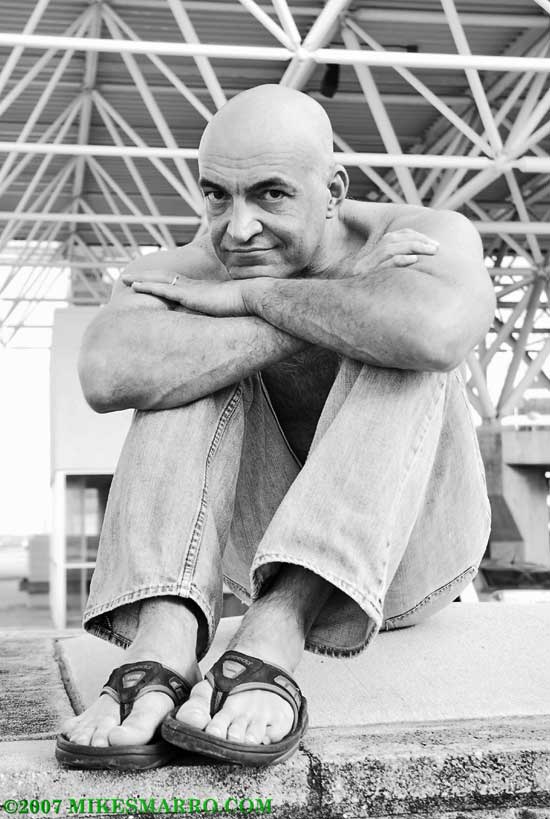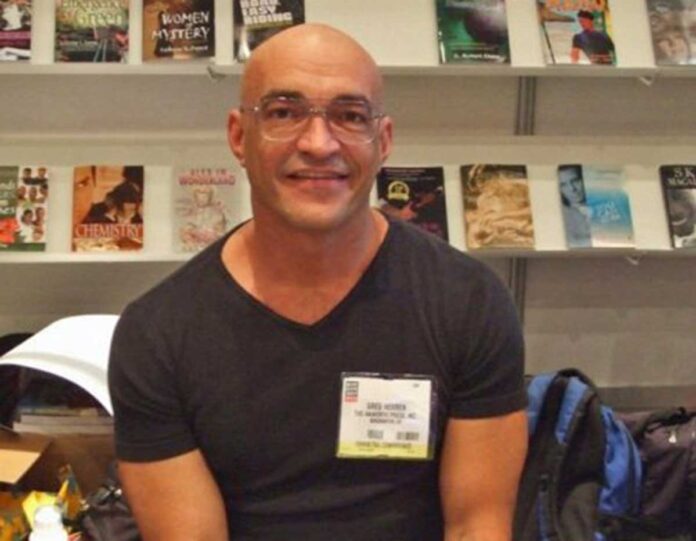While most of us spent our pandemic trying to remember to put on pants and brush our hair for that Zoom meeting, Greg Herren was being that guy, the one who had to write a book.
Make that two books. And short stories. And essays. And planning two literary festivals.

Herren is one of the best known and most read gay male mystery writers. The sheer volume of his work is as impressive as it is daunting. He’s published 67 books in all — 17 from his Scotty Bradley and Chanse MacLeod series, three short-story collections, four books under the pseudonym Todd Gregory, 10 stand alone novels, 22 anthologies and a dozen or so others. He also maintains a daily blog and has written just under 100 short stories.
With his long-time partner, Paul Willis, Herren also co-curates the annual Saints & Sinners Literary Festival. And he is deeply involved with Mystery Writers of America, the leading association for professional crime writers in the U.S., where he was the first out gay Executive Vice President.
Herren’s two most recent books, both pandemic projects, are very different stories. One, “Bury Me in Shadows,” is a ghost story with a Civil War connection that delves deeply into racism and the alternative history of the Civil War that Herren and many Southerners were taught, which he notes “bears no semblance to actual history and is why Southerners are so enraged over Critical Race Theory — it disrupts their narrative.” The other book, “#shedeservedit” is a chilling mystery story of campus rape.
Herren sat down to talk with PGN by phone from his home in New Orleans about his prolificity, the politics of being a gay writer, and the perils of cancel culture.
Though no longer engaged in direct action politics, Herren, a Democrat in one of America’s reddest states, was a longtime member of Stonewall Democrats, and his attention to politics is always at the surface. It was that, in part, that led to “#shedeservedit,” a story straight out of the #MeToo movement.
“I created these characters and this world when I was in high school,” said Herren. “I spent years writing hundreds of handwritten pages about these characters, their life, and their world. I’ve been pilfering things from that manuscript — characters, plots, etcetera — ever since, but I always knew I was going to go back and publish a book of some kind about these characters. I just never could figure out the proper story for them.”
Herren, a strong feminist ally, said, “Over the years my women friends have made me more and more aware of feminist issues, and in particular the issues around harassment, assault, and consent. It was two rather famous — or infamous — cases that happened around the same time, Steubenville, Ohio and Marysville, Missouri, that made me think, ‘THIS is your story for the Kansas book.’”
Trapped at the Newark Airport for about nine hours one Sunday, Herren read Jon Krakauer’s “Missoula: Rape and the Justice System in a College Town.” Much of the initial newspaper reporting on that case had been done by a friend of Herren’s.
“I reached out to my friend and discussed with her the possibilities of writing about this in fiction,” he said. “She was very supportive — I’ve always been lucky in that regard in this business — and I started writing the book. I wrote the first draft in a month, 98,000 words. I revised it off and on for the next five or so years between other books, and finally decided it was time to finish it.”
The politics of writing as an out and unapologetic gay man has created conflict for Herren in the past. In 2005, Herren got a taste of the real cancel culture, right-wing Republican style, when he was asked to give a talk to the Gay-Straight Alliance at Manchester High School in Richmond, Virginia.
The story as Herren recounts it was simple enough. Come speak to the group about being a gay writer and about aspirations. “This was always supposed to be a ‘follow your dreams’ speech, not some heavy LGBTQ gay agenda event,” he said. “It was just going to be me meeting with these few kids after school.”
But one teacher became incensed by the idea and complained to the principal who initially said he was not going to cancel Herren’s speech. The teacher, now even more angry, took her rage to the anti-gay group, Concerned Women of America, who in turn took it to the school board.
Herren said, “I had already booked the plane tickets. I came home to a message from a reporter in Richmond asking what my response was to my appearance being cancelled. It was the first I heard of it.”
Not only was Herren disallowed from talking to the club, he was banned from the school’s campus. The ACLU got involved, requesting that Herren be allowed to speak as planned.
“This appears to be nothing more than raw discrimination against the Gay-Straight Alliance because it dares to address the issue of homosexuality in high schools,” said ACLU of Virginia Executive Director Kent Willis at the time.
The incident didn’t end with Herren being banned from speaking. He was inundated with death threats. “They call themselves Christian, but then they bear false witness against their neighbor,” he said. “Well, have fun in hell. These people, they make Torquemada look like St. Francis of Assisi.”
Republicans have always been hypocrites, says Herren, and this was just his own personal experience of trial by fire. But what was most disappointing was that the majority of the gay press, then full into assimilationist politics, bought the right’s misrepresentation of Herren as a “gay pornographer. The Washington Blade referred to me as a pornographer. For the gay press to act like because I had written and edited erotica, that this wasn’t a story of discrimination, that I deserved it, was horrible.”
What bothered Herren most was that the right (and by not supporting him, the gay press) was that “they were going after my mystery novels which were about gay men who were happy to be gay. I was going to that school to talk to these kids about following their passions.”
Yet for all the trauma of that event and its ripple effect, it only strengthened Herren’s resolve as a writer. “I can’t imagine not being one, really. I guess the easiest way to say it is: I would write even if I didn’t get published.”
Herren also promotes and supports other writers, both through Saints & Sinners, which has several writing contests, and through his role in MWA.
“As far as I know, I am the first openly gay Executive Vice President in the history of the [MWA] organization,” he said. “I certainly am the first who wrote openly gay work, at any rate. I think that having me in the position shows all queer writers that they are welcome in the organization and that they won’t be othered if they join.”
But it’s not all acceptance and allyship. “Obviously, there are people who aren’t thrilled that I have the job — I get some lovely anonymous DM’s on social media and anonymous unsigned emails, but I also expected that,” Herren said.
He adds, “I’d love to see more queers joining and getting involved, frankly. We’ve done some exceptional work on getting more diverse voices into the membership. Just the visibility of me in the role alone changes everything. When I joined the national board the first time, part of the reason I did so was to try to make the organization more queer-friendly; I never wanted any new queer writer to feel like MWA wasn’t welcoming for them.”
As for his personal life, Herren says, “I am pretty happy, actually.” He and his partner, Paul Willis, Executive Director at the Tennessee Williams/New Orleans Literary Festival, have been together 27 years. “No matter what else is going on in the world, I know I have someone I can count on, and that’s made an enormous difference in my life.”Herren’s books, including his most recent, are available at your local independent bookstore, from publisher Bold Strokes Books, and from sellers including Barnes & Noble.
